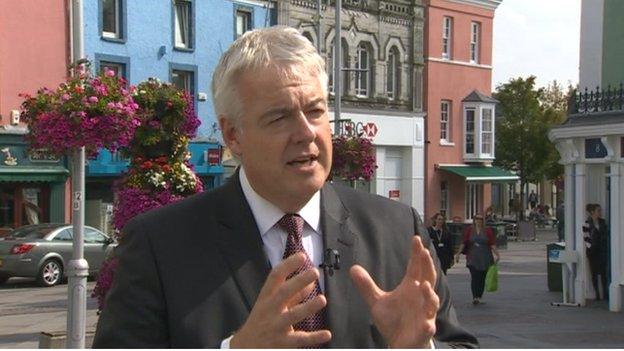Devolution powers 'lop-sided', says John Redwood
- Published
John Redwood says the devolution settlement is 'lop-sided'
A former Welsh secretary says the current devolution settlement is unfair and should change.
With just few days left of campaigning in the Scottish independence vote, Conservative MP John Redwood says Wales currently has "second rate" powers.
He also said English MPs should meet independently when dealing with matters that affect England alone.
Wales First Minister Carwyn Jones said all political parties should set out plans for more devolution next spring.
Mr Redwood said: "I'm fed up with this lop-sided devolution, this unfair devolution.
"Scotland gets first class devolution, Wales gets second class devolution and England gets nothing."
First Minister Mr Jones, who backs a Scots No vote, said Wales should not be treated separately to Scotland, although it may not end up with the same powers.
He said he hoped for progress on the Silk Commission's (the report on devolved powers for Wales) latest recommendations, external.
The first Silk Commission report paved the way for the Wales Bill, currently going through parliament.
'Manifest nonsense'
The bill devolves some tax-varying powers to Cardiff, including the possibility of a referendum on whether Welsh ministers should be able to vary income tax rates.
Former Secretary of State for Wales, Labour's Alun Michael, said: "I think a no vote allows the sensible questions about devolution to be returned to. Because the idea of complete independence is a manifest nonsense."
He told BBC Radio Wales: "It is a question of getting the balance right."
"The fact that the Barnett formula, the formula that decides what resources come to the devolved administrations, has got out of sync, has gradually worked against Wales," he said, referring to the way the UK government decides how much to give Welsh and Scottish governments.
"Resource devolution is the issue that needs to be addressed."
Dr Simon Brooks, a cultural commentator and former editor of the Welsh language current affairs magazine Barn, said Thursday's vote "raises huge, huge issues for Wales".
He said a yes vote would bring an end to the concept of Britishness but would also put independence on the agenda in Wales as something to be discussed.
"You also have the possibility that we might become more closely tied or absorbed into England," he said.
"Another possibility is we try to create a future for ourselves, negotiate a greater form of devolution for ourselves."
- Published14 September 2014
